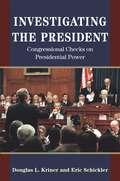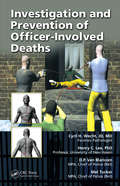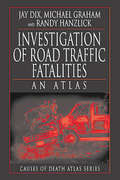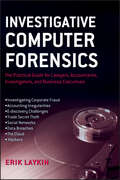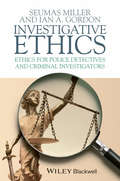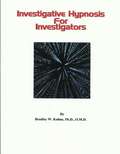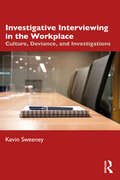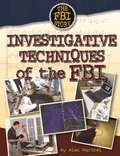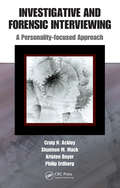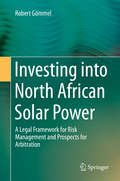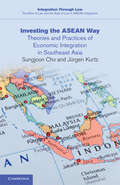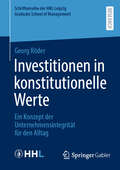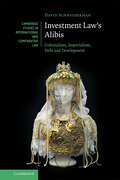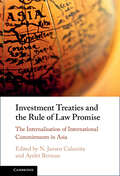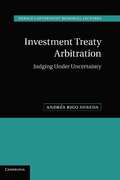- Table View
- List View
Investigating the President: Congressional Checks on Presidential Power
by Eric Schickler Douglas L. KrinerAlthough congressional investigations have provided some of the most dramatic moments in American political history, they have often been dismissed as mere political theater. But these investigations are far more than grandstanding. Investigating the President shows that congressional investigations are a powerful tool for members of Congress to counter presidential aggrandizement. By shining a light on alleged executive wrongdoing, investigations can exert significant pressure on the president and materially affect policy outcomes.Douglas Kriner and Eric Schickler construct the most comprehensive overview of congressional investigative oversight to date, analyzing nearly thirteen thousand days of hearings, spanning more than a century, from 1898 through 2014. The authors examine the forces driving investigative power over time and across chambers, identify how hearings might influence the president's strategic calculations through the erosion of the president’s public approval rating, and uncover the pathways through which investigations have shaped public policy. Put simply, by bringing significant political pressure to bear on the president, investigations often afford Congress a blunt, but effective check on presidential power—without the need to worry about veto threats or other hurdles such as Senate filibusters.In an era of intense partisan polarization and institutional dysfunction, Investigating the President delves into the dynamics of congressional investigations and how Congress leverages this tool to counterbalance presidential power.
Investigation and Prevention of Officer-Involved Deaths
by Cyril H. Wecht Henry C. Lee D.P. van Blaricom Mel TuckerEach year, too many law enforcement officers die in the line of duty and too many people are killed by the police. Yet, can any of these deaths be avoided? To answer this we must investigate the nature and causes of these deaths in an unbiased and objective manner to highlight and expose weaknesses in policy that can be amended through more rigorou
Investigation of Road Traffic Fatalities: An Atlas (Cause of Death Atlas Series)
by Jay Dix Michael Graham Randy HanzlickThe screech of rubber against asphalt. And then the crash: a violent two-car collision resulting in a twisted mass of metal, plastic, and glass-and worse, the deaths of both drivers.Accident reconstruction is but one phase of road traffic fatality (RTF) cases. Even as police officers draw their last diagram, interview their last witness, and recons
Investigative Computer Forensics
by Erik Laykin"Having worked with Erik on some of the most challenging computer forensic investigations during the early years of this industry's formation as well as having competed with him earnestly in the marketplace...I can truly say that Erik is one of the unique pioneers of computer forensic investigations. He not only can distill complex technical information into easily understandable concepts, but he always retained a long-term global perspective on the relevancy of our work and on the impact of the information revolution on the social and business structures of tomorrow."-From the Foreword by James Gordon, Managing Director, Navigant Consulting, Inc.Get the knowledge you need to make informed decisions throughout the computer forensic investigation processInvestigative Computer Forensics zeroes in on a real need felt by lawyers, jurists, accountants, administrators, senior managers, and business executives around the globe: to understand the forensic investigation landscape before having an immediate and dire need for the services of a forensic investigator.Author Erik Laykin-leader and pioneer of computer forensic investigations-presents complex technical information in easily understandable concepts, covering:A primer on computers and networksComputer forensic fundamentalsInvestigative fundamentalsObjectives and challenges in investigative computer forensicsE-discovery responsibilitiesThe future of computer forensic investigationsGet the knowledge you need to make tough decisions during an internal investigation or while engaging the capabilities of a computer forensic professional with the proven guidance found in Investigative Computer Forensics.
Investigative Ethics: Ethics for Police Detectives and Criminal Investigators
by Seumas Miller Ian A. GordonInvestigative Ethics: Ethics for Police Detectives and Criminal Investigators presents applied philosophical analyses of the ethical issues that arise for police detectives and other investigators in contemporary society. Explores ethical issues relating to investigative independence, rights of victims and suspects, use of informants, entrapment, privacy and surveillance, undercover operations, deception, and suspect interviewing Represents the first monograph providing a detailed consideration of ethical issues in police investigations Features authorship by an applied philosopher specializing in police ethics, and a former UK senior police officer Combined authorship ensures the text is anchored in actual police practice as well as providing high quality ethical analysis
Investigative Hypnosis for Investigators
by Bradley W. Kuhns, Ph.D., O.M.D.This book will be of benefit to all those investigators who serve in Federal, State, County and City law enforcement. It will be especially helpful for those that use investigative hypnosis in their duty assignments. The book describes areas of investigative inductions, deepening techniques, instant sleep suggestions, wakening techniques andmuch more and the pages cover most anything the investigator would need to conduct a competent, successful investigative hypnosis session.
Investigative Interviewing in the Workplace: Culture, Deviance, and Investigations
by Kevin SweeneyBased on extensive interdisciplinary research and the author’s over 30 years of experience in the field, this book provides best practice skills for auditors and investigators in any type of investigation and adapts them to ensure they are relevant to a corporate environment where the powers available to police are absent. In addition to providing technical skills and practical advice on investigative interviewing, former police investigator Kevin Sweeney explains how to analyze information to assist in the investigation and to identify emerging trends to provide opportunities to prevent problems before they occur. Readers will come to understand legal concepts such as the chain of evidence, the psychological factors involved in questioning, and the sociological factors that can help to build a macro understanding of the organization and the event in question. This book will become an essential resource for professionals involved in auditing or investigation work of any type in the corporate or public sectors, in contexts including human resources, employee relation investigations, auditing, or where criminal activity is suspected.
Investigative Interviewing: Psychology, Method and Practice
by SPHR), Eugene Ferraro (CPPThere are few skills more important to the modern fact finder than the ability to obtain information through effective interviewing. While most interviewing books are intended for law enforcement, they often present harsh and accusatory techniques that can be counterproductive in private sector investigations.Investigative Interviewing: Psychology,
Investigative Techniques of the FBI
by Alan WachtelThe federal Bureau of Investigation (FBI) is a national agency dedicated to investigation federal crimes. Founded as a small team of special agents on July 26, 1908, the Bureau was first charged with enforcing the growing body of federal laws covering the United States as a whole. Almost from the beginning of its 100-year history, the Bureau has been the subject of legend and controversy. It has also evolved into a vast and sophisticated national law-enforcement agency. Whether as a federal crime-fighting force or a source of investigative support of local and state police forces, the modern FBI strives to embody its ideals of fidelity, bravery, and integrity. In 1993, a huge explosion rocked New York's World Trade Center, killing six people, injuring hundreds more, and turning the building's basement into a deadly underground cave. FBI investigators and explosives experts tracked down the bombers and gathered the evidence that sent them to prison. The methods the FBI used to solve that crime are representative of the techniques FBI agents use in a wide assortment of criminal investigations. From old-fashioned detective work to the most advanced forensic technologies, the FBI's arsenal of investigative techniques is vast, sophisticated, and growing.
Investigative and Forensic Interviewing: A Personality-focused Approach
by Philip Erdberg Craig N. Ackley Shannon M. Mack Kristen BeyerInvestigative and Forensic Interviewing: A Personality-Focused Approach looks at the personality styles most commonly encountered in the criminal justice system and demonstrates how to use this insight to plan and conduct a productive interview. The book includes chapters on narcissistic, antisocial, psychopathic, borderline, inadequate/immature, p
Investing into North African Solar Power
by Robert GömmelThis book investigates how a North African solar thermal power plant can be set up under the guidance of European investors (e. g. the Desertec Concept) as a Public Private Partnership (PPP). It outlines the importance of early awareness of contract-related risks, investment risks and dispute settlement, arguing that commercial and investment arbitration are the best tools for settling disputes regarding a large-scale solar thermal project. Furthermore, by comparing institutional and ad hoc arbitration, it shows that the former offers highly suitable support. The latest developments in the area of investment arbitration under EU law and the general acceptance of arbitration in Islamic countries are examined in particular. This book also demonstrates that a solar thermal power plant must meet certain requirements to be considered an investment. These requirements are examined in relation to Art. 25 of the International Centre for Settlement of Investment Disputes Convention (ICSID Convention) and respective case law. Overall, the book offers valuable guidelines for investors and host states on how to successfully implement large-scale solar thermal projects.
Investing the ASEAN Way: Theories and Practices of Economic Integration in Southeast Asia (Integration through Law:The Role of Law and the Rule of Law in ASEAN Integration #19)
by Sungjoon Cho Jürgen KurtzIn recent decades, South East Asia has become one of the world's most popular destinations for foreign investment. The member states of the Association of Southeast Asian Nations (ASEAN) have employed varying modalities to pursue first security and then economic cooperation. This book explores regional law and governance in ASEAN through the lens of its regulation of foreign investment. It adopts a new framework to identify the unique ontological autonomy of the ASEAN Investment Regime beyond a simple aggregation of its individual member states. It deploys a sociology-led approach (especially constructivism) and emphasizes ideational factors (such as culture and norms) that guide state actions from within. The book explores the manner in which ASEAN's history and culture have fundamentally shaped its foreign investment policies, leading to outcomes that often depart fundamentally from the external structure and script of Global Investment Law.
Investitionen im chinesischen Gesundheits- und Pflegesektor: Chancen und Möglichkeiten für ausländische Investoren
by Björn EtgenDieses Fachbuch vermittelt erfolgversprechende Strategien für Investitionen in das zukunftsträchtige Gesundheits- und Pflegewesen der Volksrepublik China. Der chinesische Gesundheitssektor wächst stetig und die chinesische Regierung hat erkannt, dass die Beteiligung ausländischer Investoren zur Verbesserung und Weiterentwicklung des chinesischen Gesundheitswesens, insbesondere in Ballungsgebieten, unabdingbar ist. Dies eröffnet Chancen und Möglichkeiten für ausländische Gesundheitsdienstleister, deren Investitionen in zunehmendem Maße von der chinesischen Regierung begrüßt und unterstützt werden. Das Buch stellt Möglichkeiten vor, um ebenso sichere wie gewinnbringende Investitionen im chinesischen Gesundheitsmarkt zu tätigen: von der Errichtung neuer Krankenhäuser und Pflegeheime über die Einführung des erforderlichen medizinischen Equipments bis hin zur Akquise und Einstellung qualifizierter Mitarbeiter. Hierbei werden insbesondere die rechtlichen Rahmenbedingungen beleuchtet.
Investitionen in Pflegeimmobilien: Besonderheiten bei betreutem Wohnen (essentials)
by Clemens Engelhardt Peter S. PrzewieslikDas essential vermittelt kompakt das Grundwissen der vertraglichen Beziehungen zwischen Pflegeheimbetreiber und Developer bzw. Investor/Eigentümer. Es wird auf die unterschiedlichen Vertragspunkte eingegangen. Wer die Asset-Klasse Pflegeimmobilie kennt, dem ist klar, dass die rechtlichen Anforderungen nicht lediglich das klassische Mietrecht betreffen, sondern dass es hier u.a. auch aufgrund der langen Laufzeiten (25 Jahre und mehr), der Eigenschaft als „single tenant use“ sowie sozial- und verbraucherschutzrechtlicher Vorgaben besonderer Vereinbarungen zwischen dem Betreiber und dem Eigentümer der Immobilie bedarf.
Investitionen in konstitutionelle Werte: Ein Konzept der Unternehmensintegrität für den Alltag (Schriftenreihe der HHL Leipzig Graduate School of Management)
by Dr. Georg Röder PhDAls kontrovers und umfangreich diskutiertes Konzept nimmt Unternehmensintegrität einen wichtigen Platz in der wissenschaftlichen Debatte der letzten Jahrzehnte ein. Dabei verpasst es die wirtschaftsethische Auseinandersetzung jedoch, konzeptionell die so wichtige Brücke zur unternehmerischen Praxis zu schlagen und systematische Aspekte des Alltags zu berücksichtigen. In der Folge herrscht in der Wirtschaft ein hohes Maß an Unklarheit in Bezug auf die Handlungsimplikationen von Unternehmensintegrität – insbesondere in jenen alltäglichen dilemmatischen Situationen, in welchen häufig nicht eindeutig ist, was zu tun bzw. was zu unterlassen ist, obwohl man es tun könnte. Diesem Problemzusammenhang widmet sich die vorliegende Arbeit, indem sie den Diskurs um einen in dieser Form neuen konzeptionellen Zugang zu Unternehmensintegrität ergänzt. Dabei integriert sie Aspekte positiver und normativer Moralbegründung und arbeitet so unter methodischer Berücksichtigung ökonomischer Interaktionszusammenhänge individualmoralische Ansprüche an die Integrität von Unternehmen heraus. Dadurch schafft sie es, systematisch belastbare Orientierungspunkte in Bezug darauf zu definieren, was sich berechtigterweise von Unternehmen erwarten lässt, sofern diese eine integre Haltung für sich beanspruchen.
Investitionsschutz für Maschinendaten: Eine Untersuchung des Schutzes maschinengenerierter Daten der Industrie 4.0 durch das Datenbankherstellerrecht
by Angelina ZierDie intelligente Produktion in der Industrie 4.0 erfordert einen stetigen Austausch sowie die Verarbeitung riesiger Mengen maschinengenerierter Daten. Deshalb sind diese Daten zu einem zentralen Produktionsmittel und Wirtschaftsgut mit erheblichem Wert geworden. Aus diesem Grund haben die datenhaltenden Unternehmen ein großes Interesse daran, ihre Daten für sich selbst gewinnbringend zu nutzen. Demgegenüber besteht wegen der immer größeren Bedeutung der Maschinendaten auch ein erhebliches Interesse am Zugang zu den Daten anderer Unternehmen. Deshalb ist ein Rechtsrahmen für maschinengenerierte Daten erforderlich, der einen hinreichenden Schutz gewährt, aber auch ausreichende Datenzugangsmöglichkeiten etabliert. Ein geeignetes Datenmanagement in der Industrie 4.0 erfordert regelmäßig die Einrichtung von Datenbanken zur Speicherung und Verarbeitung der maschinengenerierten Daten. Deshalb liegt die Anwendung des Datenbankherstellerrechts nahe, um einen rechtlichen Schutz der Daten zu ermöglichen. Die Autorin untersucht, ob das Datenbankherstellerrecht auf Industrie 4.0-Datenbanken Anwendung finden kann und welche Probleme sich dabei ergeben. Es werden Vorschläge für eine Adaption des Datenbankherstellerrechts gemacht.
Investment Implications of Selected WTO Agreements and the Proposed Multilateral Agreement on Investment
by Matthias VockeA report from the International Monetary Fund.
Investment Law within International Law
by Freya BaetensDevelopments within various sub-fields of international law influence international investment law, but changes in investment law also have an impact on the evolution of other fields within international law. Through contributions from leading scholars and practitioners, this book analyses specific links between investment law and other sub-fields of international law such as the law on armed conflict, human rights, sustainable development, trade, development and EU law. In particular, this book scrutinises how concepts, principles and rules developed in the context of such sub-fields could inform the content of investment law. Solutions aimed at resolving problems in other settings may provide instructive examples for addressing current problems in the field of investment law, and vice versa. The underlying question is whether key sub-fields of public international law, notably international investment law, are open to cross-fertilisation, or, whether they are evolving further into self-contained regimes.
Investment Law's Alibis: Colonialism, Imperialism, Debt and Development (Cambridge Studies in International and Comparative Law)
by David SchneidermanThis book aims to connect narratives associated with the past to the international regime that protects property and contract rights of foreign investors. The book scrutinizes justifications offered to sustain practices associated with colonialism, imperialism, civilized justice, debt, and development, revealing that a number of the rationales offered in support of investment law disciplines replicate those arising out of this discredited past. By revealing these linkages, the book raises concerns about investment law's premises. It would appear that the normative foundations for today's regime reproduces discursive practices that are less than compelling. The book argues that citizens deserve something more than historically discredited reasons to justify the exercise of power over them – something more than mere pretext.
Investment Property Valuation Today
by Tim HavardFirst Published in 2002. Routledge is an imprint of Taylor & Francis, an informa company.
Investment Screening and WTO Law: The Example of the EU Screening Regulation (SpringerBriefs in Law)
by Erich VranesIn recent years, there has been a worldwide intensification in the use of investment screening mechanisms. This surge is connected with political re-orientations, the rise of new economic powers, and security concerns. Despite the considerable effects that investment screening may have on international investment and trade, there is hardly any literature examining the consequences to be drawn from relevant WTO rules for investment screening. However, the importance of WTO law for such instruments is substantial not least due to the broad scopes of application of the GATT and GATS agreements. The risk that screening activities could be challenged before the WTO is underlined by pertinent panel reports. This book in particular uses the 2019 EU Screening Regulation as an example for illustrating the relevance that WTO law has for investment screening. It concludes that in the light of relevant WTO rulings screening activities undertaken for public order and security reasons may face considerable hurdles not least in the general exceptions and security exceptions of the GATT and the GATS.
Investment Treaties and the Rule of Law Promise: An Examination of the Internalisation of International Commitments in Asia
by Ayelet Berman N. Jansen CalamitaInvestment treaties are said to improve the rule of law in the states which enter into them. Fearing claims, governments will internalise international investment obligations into their decision-making processes, resulting in positive spill-over effects on the rule of law. Such arguments have never been backed by empirical research. This book presents an analytical framework for thinking about the internalisation of international commitments in governmental decision making that takes account of the complexities of governance. In so doing, it provides a typology of processes whereby international treaty obligations may be internalised by governments and identifies factors which may affect whether and to what extent international commitments are internalised in governmental decision making. This framework serves as the background for the main body of the book in which empirical case studies address whether and how a select group of governments in Asia internalise international investment treaty obligations in their decision-making.
Investment Treaty Arbitration
by Andrés Rigo SuredaInvestment claims have exposed the vague nature of the standards by which arbitral tribunals are expected to adjudicate them and the policy reasons which explicitly or implicitly have an influence. The ad hoc nature of the tribunals and the decisions reached on various controversial issues have brought to the fore the issue of consistency. Andrés Rigo Sureda's Hersch Lauterpacht Memorial Lecture examines how arbitral discretion is exercised in the face of uncertainty of the law. It explores the choices made by arbitral tribunals as they approach treaty interpretation, as they search for limits in determining jurisdiction and the content of the standards of protection and as they search for consistency in the exercise of arbitral discretion.
Investment Treaty Arbitration as Public International Law
by Eric De BrabandereInvestment treaty arbitration is fast becoming one of the most common methods of dispute settlement in international law. Despite having ancient roots, the private interests in international investment relations remain in conflict with the need for the recognition of the public international law features of the arbitral procedure. This book, which presents an account of investment treaty arbitration as a part of public international law - as opposed to commercial law - provides an important contribution to the literature on this subject. Eric De Brabandere examines the procedural implications of conceiving of investment treaty arbitration in such a way, with regards to issues such as the principles of confidentiality and privacy, and remedies. The author demonstrates how the public international law character of investment treaty arbitration derives from and has impacted upon the dispute settlement procedure.
Investment Treaty Law and Climate Change
by Tomás Restrepo RodríguezThe book deals with the question whether the investment treaty law system could be harmonized with the climate change international legal framework and the climate interest that lies beyond. The answer to this research question is divided into three parts. The first examines the relevance of the climate change international legal framework in investment treaty disputes as a natural pre(logical)interpretative stage. The second focuses on the BIT’s content-interpretation, which is the orthodox approach to solve the fragmentation between the system of investment treaty law and the system of international climate change law. Finally, the third part tackles this fragmentation through a heterodox approach that is grounded in the direct application of climate change principles through law ascertainment. Apart from concluding that harmonization between investment treaty law and international climate change law is possible through the orthodox approach to the expropriation and the FET standards, as well as through the direct application of the climate change precautionary principle and the CBDRRC principle − heterodox approach, the book suggests that tribunals are expected soon to openly address climate change disputes in their rulings.
